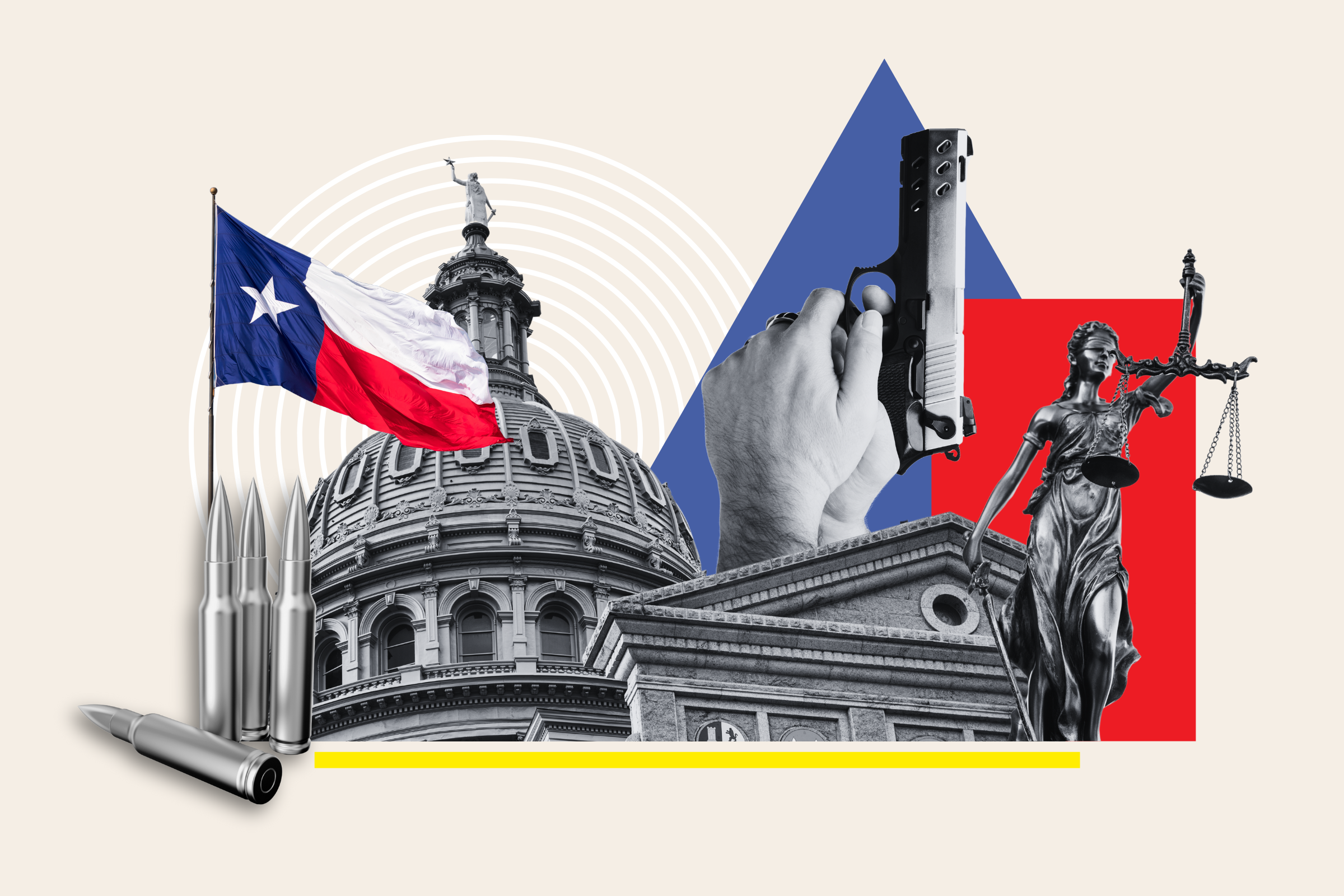A bill that would make it harder for Texas to create Red Flag laws passed the Texas state Senate , despite the laws being popular among Texans. Senate Bill 1362 , known as the Anti-Red Flag Act, sponsored by state Senator Bryan Hughes , says that Extreme Risk Protective Orders (ERPOs), otherwise known as Red Flag laws, violate due process and the Second Amendment. Proponents of Red Flag laws say they have been proven to reduce gun-related homicides and suicides.
Newsweek contacted Hughes via email for comment. Why It Matters Red Flag laws/ERPOs are laws that allow law enforcement, judges and local governments to temporarily remove guns from people deemed to be a threat to themselves or others. The laws saw a surge in support following the 2022 shooting at Robb Elementary School in Uvalde, Texas, when 19 children and two teachers were killed by gun violence.

The shooter in Uvalde gained the nickname "school shooter" prior to becoming one as he frequently made violent threats around the school. Red Flag laws are intended to temporarily prevent people who are known as threats to themselves or others—such as someone with the nickname "school shooter"—from having access to a gun. What To Know A study from the University of Houston's Hobby School of Public Affairs found that 88 percent of Texans are in favor of Red Flag laws.
Chris McNutt, president of Texas Gun Rights & Texas Gun Rights Foundation and supporter of SB 1362, told Newsweek : "Polling results often depend on how questions are worded. If you ask someone if they want to "stop dangerous people from having guns," sure, they'll say yes. But once voters realize Red Flag laws allow the government to confiscate guns from people who haven't been charged with a crime—based on hearsay, behind closed doors—support crumbles.
" The exact wording of the poll is: "Texans support allowing judges to take guns away from people shown to be a danger to themselves or others (i.e., a red flag law), with 64% strongly supporting this legislation.
" The study also found that 91 percent of Texans support requiring all gun buyers at a gun show to go through a criminal background check, 89 percent of Texans support background checks for all gun purchasers, including at a private sale, and a majority of Texans support a wide range of other gun control measures. Texas does not currently have a Red Flag law on the books. This bill would make it so that if the state Legislature ever does want to pass any sort of Red Flag law, it would have to first pass a bill saying that it will then pass a Red Flag bill.
The Anti-Red Flag bill would also make it illegal for Texas law enforcement or courts to enforce ERPOs on people from other states. Meaning, someone who is prohibited from owning a gun in Florida could come to Texas and buy one there . McNutt told Newsweek : "We don't need new laws.
If someone is making credible threats or is mentally unstable, existing laws already allow for arrests, mental health evaluations, and emergency detentions—all of which come with constitutional safeguards. But disarming someone while leaving them free in society? "That's not public safety. That's political theater.
Dangerous people belong in jail—not left roaming the streets without their guns. Red Flag laws don't stop violence. They just trample the rights of the innocent.
" Unlike in Texas, a school shooting in Florida prompted the state to implement Red Flag laws in 2018. Following this implementation, gun-related homicide rates in the state fell by 11 percent between 2019-2021. Although guns are often tied to homicide, gun owners are also at a much higher risk of dying by suicide than non-gun owners.
After Connecticut started enforcing its Red Flag laws in 2007, gun-related suicides fell by 13.7 percent in the state. "We could be one tragedy away in yet another "gun free zone" for this to become a real threat—and there are multiple Red Flag gun confiscation bills filed in Texas every legislative session," McNutt said.
"After our very own ' Republican ' Senator John Cornyn teamed up with Joe Biden to help incentivize the passage of ERPO laws in 2022 by dangling money in front of states, we don't wait for gun control to show up on our doorstep before fighting it. We want to slam the door shut before it can get anywhere near us. SB 1362 is a preemptive strike to protect the rights of Texans before it's too late.
" Hughes and McNutt argue that Red Flag laws impede the right to due process and the Second Amendment. Kelly Sampson, senior policy counsel for Strategic Engagement at Brady United, spoke to Newsweek about this argument, saying that in her legal expertise it's not the case for a number of reasons. First, ERPOs are temporary injunctions.
They do not result in a permanent removal of anyone's guns, and usually last for around one year. "They're all temporary," Sampson said. "It's not like you're from henceforth and forevermore unable to have a firearm.
Usually if you are subject to an ERPO there will be a time period in the statute where you can petition to have it overturned." Second, people who are placed under an ERPO are notified by law enforcement and have the opportunity to appeal it before their guns are set to be confiscated, and throughout the duration of the ERPO. By Sampson's analysis, that means gun owners under an ERPO are afforded due process.
"There are evidentiary standards for ERPOs," Sampson said. "It can be different by state, but by and large, you have to have a reasonable basis [for an ERPO]. Law enforcement oftentimes is the party that petitions for an ERPO, based on evidence that they have.
..It's not a punishment.
The subject of the ERPO has an opportunity to make their own case in a court, to argue that they shouldn't be subject to it." McNutt disagrees with Sampson, saying: "Appealing afterward doesn't make it right. You can't claim to respect due process if the government kicks in your door and seizes your firearms before you've had your day in court.
That's not justice—it's state-sanctioned gun confiscation based on feelings, not facts." McNutt also said that "Red Flag laws typically allow a judge to order the confiscation of someone's firearms based on an unproven allegation, without the accused ever being present in court or notified ahead of time." According to Sampson, most people under ERPOs are notified beforehand.
Emergency ERPOs are enacted in extreme circumstances when someone is determined to be an immediate risk to themselves or others. These can be appealed in court. Sampson also touched on how ERPOs reduce suicides, saying: "ERPOs are a really great tool for someone with firearms because their greatest risk is suicide.
If you're having a crisis, we want you to live through that crisis. "They are a temporary way to get people the space they need to get help and get through the crisis and then come back. When people think gun violence, they think homicide, [but] suicide is the bulk of gun deaths.
This is a great way to address that while allowing people to have their firearms." Hughes said the bill would not apply to domestic violence orders of protection. That's also in keeping with polling, as the Hobby School poll found that 90 percent of Texans support banning gun possession for anyone with a restraining order filed against them for domestic violence or stalking.
What People Are Saying Chris McNutt, president of Texas Gun Rights & Texas Gun Rights Foundation, told Newsweek : "This bill is not just about guns. It's about preserving the bedrock principles of our legal system. Texans shouldn't have to choose between safety and liberty—and with SB 1362, they won't have to.
" Nicole Gollis Golden, executive director of Texas Gun Sense, told Newsweek : "Texans support ERPOs, and we have experienced tragedies that could have been avoided had this law been in place. In fact, last year, a woman known to be a danger to herself and others perpetrated a shooting at Lakewood Church in Houston and two people were wounded, including her young child. An ERPO may have also prevented the 2019 mass shooting in El Paso.
ERPOs are a proven measure for preventing homicides and suicides, and Texans deserve this safety measure." Kelly Sampson, senior policy counsel for Strategic Engagement at Brady United, told Newsweek : "ERPOs have been increasingly something that states have passed and they work. They really do help address a big problem which is that when you have a firearm and you're going through a crisis you may use that firearm in ways that you would never ever imagine using it when you're in a better time.
They are a temporary way to get people the space they need to get help and get through the crisis and then come back." What Happens Next The bill has passed through the state Senate and is now headed to the Texas state House..
Top

Texas Red Flag Moves at Odds With Public

A bill that passed through the Texas state Senate that would ban Red Flag laws is at odds with public polling on gun control.











-1745121369054_v.webp)